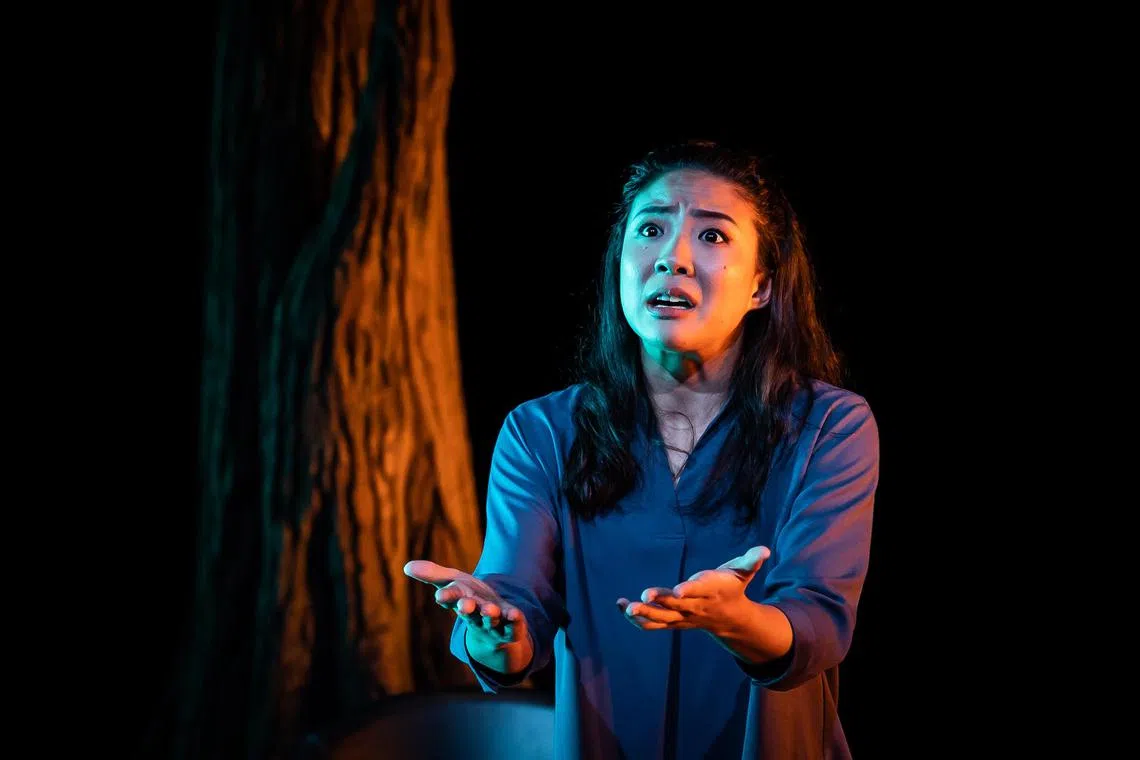Theatre Review: One-woman play I Am Trying To Say Something True let down by unsatisfying script
Sign up now: Get ST's newsletters delivered to your inbox

Performer Sabrina Sng in one-woman play I Am Trying To Say Something True, which explores a queer 28-year-old’s coming of age.
PHOTOS: BERNIE NG
Follow topic:
The Studios: Trip
Esplanade Theatre Studio
Last Saturday, 8pm
Risa, whose name means laughter in Spanish, has not laughed in a long time. After smashing her work laptop in the office pantry in a fit of rage, she finds herself in her therapist’s office, struggling to list 10 things about herself that are true.
Written by Michelle Tan, I Am Trying To Say Something True is a talk-y, earnest exploration of a queer 28-year-old’s coming of age. A one-woman play, it takes place wholly in a therapist room with all the trappings, down to the disembodied voice of an off-stage therapist.
It is the sort of set-up that arguably requires the humour and wry self-knowledge of Phoebe Waller-Bridge’s Fleabag to succeed. The award-winning play, which was later adapted into a comedy series, revolves around a woman navigating life in London while trying to cope with a recent tragedy. Tan’s script, however, opts for a lackadaisical sincerity, furthered hampered by a tendency to overexplain and leave too little to the imagination.
One leaves the theatre craving a little more acting and ambition.
Director Renee Yeong puts up this play under the tutelage of The Esplanade’s Trip programme that supports young directors, finding most joy in performer Sabrina Sng’s choreography, and the lighting, set and sound by seasoned backstage veterans.
Whether running her palms over water or smilingly beckoning her girlfriend, Sng – through bodily movements – manages to imbue Risa’s reminiscence with a gentle beauty. She quite literally dips her toes in the pool of therapy and ends up soaking wet.
Petrina Dawn Tan’s set places her therapy chair in the middle of a pool, an invention that makes for diluvian drama. At the play’s climax, Sng thrashes in it amid the immensity of Jing Ng’s thunderstorm soundscape. Later, Sng slips from the reclining chair into the pool as enervating depression threatens to drown her, in one of the few moments of real impact.
But Tan’s script is too fragile a skeleton to support a full-fledged Risa, choosing to boil the character’s grief down to the central conflict between queerness and religion.
The focus on this single axis misses out opportunities to explore the other contradictions of youth, promised at the start when Risa loses her job. Instead, her transition from school to work and the dissatisfaction of having to clock in and out of a bureaucratic civil service job is unexplored. Too little is also said about her choice to return from the United States and Australia to more conservative Singapore, or her time living as a minority overseas.
Perhaps most critically, Tan’s script seems to sometimes forget that its medium is theatre, as when it has Sng prefacing her off-screen therapist’s voice with “She said” or leads her to describe her unseen grandmother’s actions instead of having audiences intuit them.
This makes Sng both actor and narrator – a gambit that does not work well. For all of Risa’s claims of not having the words to describe her grief, she prattles on, fully articulate, parsing and stretching every emotional calculation to its logical conclusion.

Performer Sabrina Sng in one-woman play I Am Trying To Say Something True, which explores a queer 28-year-old’s coming of age.
PHOTOS: BERNIE NG
Where Tan must be lauded is her willingness to take religion as a motivating factor seriously. At a time when too many playwrights easily play it off for laughs, Risa is serious about her belief in God and tries to navigate this space.
At one point, she recites The Lord’s Prayer in Mandarin. Her girlfriend’s comment that she might have been willing to go with Risa to church for the rest of her life as they break up is truly heartbreaking.
The “phase” of the 20s is a time for messiness and mistakes, sacrifices and finding ways to live with these. While talking about queerness is a good start for Yeong, separating one root from the rest of Risa’s tree does not feel like, and cannot be, the convincing truth.


